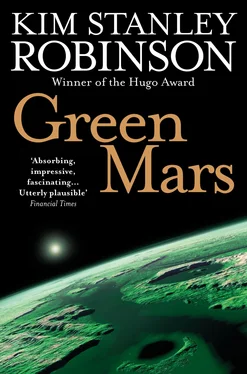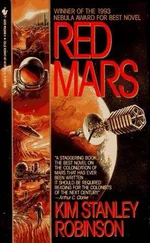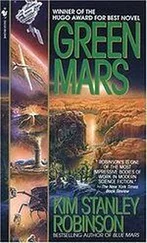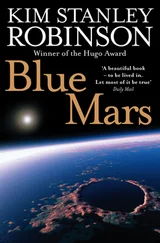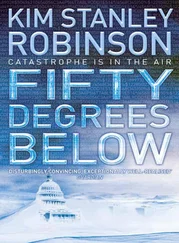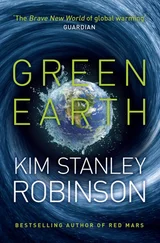They huddled together speechlessly as the adults herded them into the lock. There was a hissing noise, and then the outer door opened. Clutching the adults they walked cautiously outside, bumping together as they moved.
It was too bright to see. They were in a swirling white mist. The ground was dotted with intricate ice flowers, all aglint in the bath of light. Nirgal was holding Hiroko and Coyote by the hand, and they propelled him forward and let go of his hands. He staggered in the onslaught of white glare. “This is the fog hood,” Hiroko’s voice said over an intercom in his ear. “It lasts through the winter. But now it’s Ls 205, springtime, when the green force pushes hardest through the world, fuelled by the sun’s light. See it!”
He could see nothing but it: a white coalescing fireball. Sudden sunlight pierced this ball, transforming it into a spray of colour, turning the frosty sand to shaved magnesium, the ice flowers to incandescent jewels. The wind pushed at his side and rent the fog; gaps in it appeared, and the land gaped off into the distance, making him reel. So big! So big—everything was so big—he went to one knee on the sand, put his hands on his other leg to keep his balance. The rocks and ice flowers around his boots glowed as if under a microscope. The rocks were dotted with round scales of black and green lichen.
Out on the horizon was a low flat-topped hill. A crater. There in the gravel was a rover track, nearly filled with frost, as if it had been there a million years. Pattern pulsing in the chaos of light and rock, green lichen pushing into the white … Everyone was talking at once. The other children were beginning to race around giddily, shrieking with delight as the fog opened up and gave them a glimpse of the dark pink sky. Coyote was laughing hard. “They’re like winter calves let out of the barn in spring, look at them tripping, oh you poor dear things—ah ha ha—Roko, this is no way to make them live!” cackling as he lifted kids off the sand and set them on their feet again.
Nirgal stood, bounced experimentally. He felt he might float away, he was glad the boots were so heavy. There was a long mound, shoulder-high, snaking away from the ice cliff. Jackie was walking its crest and he ran to join her, staggering at the incline, at the jumbled rock on the ground. He climbed onto the ridge and got into his running rhythm, and felt as if he were flying, as if he could run forever.
He stood by her side. They looked back at the ice cliff, and shouted with a fearful joy; it rose up forever into the fog. A shaft of morning light poured over them like molten water. They turned away, unable to face it. Blinking away floods of tears, Nirgal saw his shadow cast against the fog scraping over the rocks below them. The shadow was surrounded by a bright circular band of rainbow light. He shouted loudly and Coyote raced up to them, his voice in Nirgal’s ear crying, “What’s wrong? What is it?”
He stopped when he saw the shadow. “Hey, it’s a glory! That’s called a glory. It’s like the Spectre of the Brocken. Wave your arms up and down! Look at the colours! Christ Almighty, aren’t you the lucky ones!”
On an impulse Nirgal moved to Jackie’s side, and their glories merged, becoming a single nimbus of glowing rainbow colours, surrounding their blue double shadow. Jackie laughed with delight and went off to try it with Peter.
About a year laterNirgal and the other children began to figure out how to deal with the days when they were taught by Sax. He would start at the blackboard, sounding like a particularly characterless AI, and behind his back they would roll their eyes and make faces as he droned on about partial pressures or infrared rays. Then one of them would see an opening and begin the game. He was helpless before it. He would say something like, “In non-shivering thermogenesis the body produces heat using futile cycles,” and one of them would raise a hand and say, “But why, Sax?” and everyone would stare hard at their lecterns and not look at each other, while Sax would frown as if this had never happened before, and say, “Well, it doesn’t use as much energy as shivering does. The muscle proteins contract, but instead of grabbing they just slide over each other, and that creates the heat.”
Jackie, so sincerely the whole class nearly lost it: “But how?”
He was blinking now, so fast they almost exploded watching him. “Well, the amino acids in the proteins have broken covalent bonds, and the breaks release what is called bond dissociation energy.”
“But why?”
Blinking ever harder: “Well, that’s just a matter of physics.” He diagrammed vigorously on the blackboard: “Covalent bonds are formed when two atomic orbitals merge to form a single bond orbital, occupied by electrons from both atoms. Breaking the bond releases thirty to a hundred k cals of stored energy.”
Several of them asked, in chorus, “ But why ? ”
This got him into sub-atomic physics, where the chain of whys and becauses could go on for a half hour without him ever once saying something they could understand. Finally they would sense they were near the endgame. “But why?”
“Well,” beginning to go cross-eyed, “atoms want to get to their stable number of electrons, and they’ll share electrons when they have to.”
“But why? ”
Now he was looking trapped. “That’s just the way atoms bond. One of the ways.”
“But WHY ?”
A shrug. “That’s how the atomic force works. That’s how things came out—”
And they all would shout, “ in the Big Bang! ”
They would howl with glee, and Sax’s forehead would knot up as he realised that they had done it to him again. He would sigh, and go back to where he had been when the game began. But every time they started it again, he never seemed to remember, as long as the initial why was plausible enough. And even when he did recognise what was happening, he seemed helpless to stop it. His only defence was to say, with a little frown, “Why what?” That slowed the game for a while; but then Nirgal and Jackie got clever at guessing what in any statement most deserved a why , and as long as they could do that, Sax seemed to feel it was his job to continue answering, right on up the chains of because to the Big Bang, or, every once in a while, to a muttered “We don’t know.”
“We don’t know!” the class would exclaim in mock dismay. “Why not ?”
“It’s not explained,” he would say, frowning. “Not yet.”
And so the good mornings with Sax would pass; and both he and the kids seemed to agree that these were better than the bad mornings, when he would drone on uninterrupted, and protest, “This is really a very important matter” as he turned from the blackboard and saw a crop of heads laid out snoring on the desktops.
One morning, thinking about Sax’s frown, Nirgal stayed behind in the school until he and Sax were the only ones left, and then he said, “Why don’t you like it when you can’t say why?”
The frown returned. After a long silence Sax said slowly, “I try to understand. I pay attention to things, you see, very closely. As closely as I can. Concentrating on the thisness of every moment. And I want to understand why it happens the way it does. I’m curious. And I think that everything happens for a reason. Everything. So, we should be able to tease these reasons out. When we can’t … well, I don’t like it. It vexes me. Sometimes I call it—” he glanced at Nirgal shyly, and Nirgal saw that he had never told this to anyone before— “I call it the great unexplainable.”
It was the white world, Nirgal saw suddenly. The white world inside the green, the opposite of Hiroko’s green world inside the white. And they had opposite feelings about them. Looking from the green side, when Hiroko confronted something mysterious, she loved it and it made her happy—it was viriditas, a holy power. Looking from the white side, when Sax confronted something mysterious, it was the Great Unexplainable, dangerous and awful. He was interested in the true, while Hiroko was interested in the real. Or perhaps it was the other way around—those words were tricky. Better to say she loved the green world, he the white.
Читать дальше
